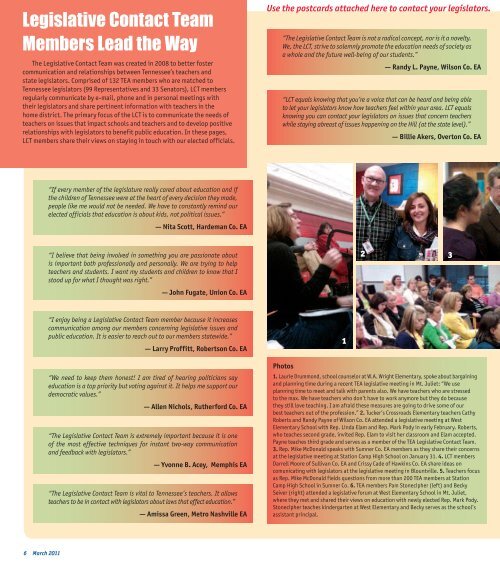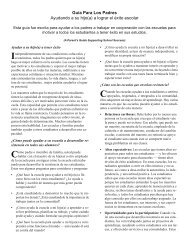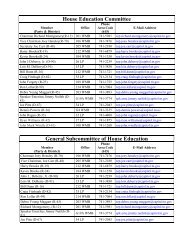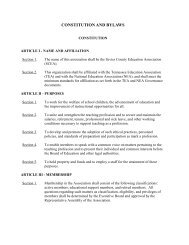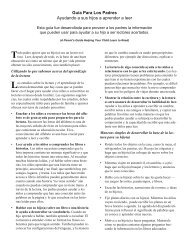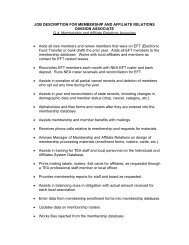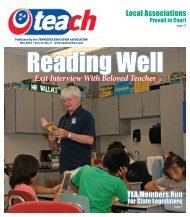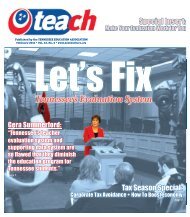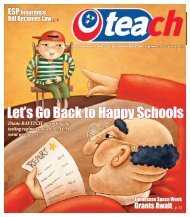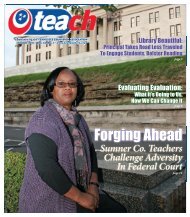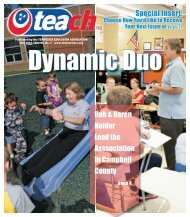Tennessee's Teachers Will Not Be Silenced - Tennessee Education ...
Tennessee's Teachers Will Not Be Silenced - Tennessee Education ...
Tennessee's Teachers Will Not Be Silenced - Tennessee Education ...
Create successful ePaper yourself
Turn your PDF publications into a flip-book with our unique Google optimized e-Paper software.
Legislative Contact Team<br />
Members Lead the Way<br />
The Legislative Contact Team was created in 2008 to better foster<br />
communication and relationships between <strong>Tennessee</strong>’s teachers and<br />
state legislators. Comprised of 132 TEA members who are matched to<br />
<strong>Tennessee</strong> legislators (99 Representatives and 33 Senators), LCT members<br />
regularly communicate by e-mail, phone and in personal meetings with<br />
their legislators and share pertinent information with teachers in the<br />
home district. The primary focus of the LCT is to communicate the needs of<br />
teachers on issues that impact schools and teachers and to develop positive<br />
relationships with legislators to benefit public education. In these pages,<br />
LCT members share their views on staying in touch with our elected officials.<br />
“If every member of the legislature really cared about education and if<br />
the children of <strong>Tennessee</strong> were at the heart of every decision they made,<br />
people like me would not be needed. We have to constantly remind our<br />
elected officials that education is about kids, not political issues.”<br />
— Nita Scott, Hardeman Co. EA<br />
“I believe that being involved in something you are passionate about<br />
is important both professionally and personally. We are trying to help<br />
teachers and students. I want my students and children to know that I<br />
stood up for what I thought was right.”<br />
— John Fugate, Union Co. EA<br />
“I enjoy being a Legislative Contact Team member because it increases<br />
communication among our members concerning legislative issues and<br />
public education. It is easier to reach out to our members statewide.”<br />
— Larry Proffitt, Robertson Co. EA<br />
“We need to keep them honest! I am tired of hearing politicians say<br />
education is a top priority but voting against it. It helps me support our<br />
democratic values.”<br />
— Allen Nichols, Rutherford Co. EA<br />
“The Legislative Contact Team is extremely important because it is one<br />
of the most effective techniques for instant two-way communication<br />
and feedback with legislators.”<br />
— Yvonne B. Acey, Memphis EA<br />
“The Legislative Contact Team is vital to <strong>Tennessee</strong>’s teachers. It allows<br />
teachers to be in contact with legislators about laws that effect education.”<br />
— Amissa Green, Metro Nashville EA<br />
Use the postcards attached here to contact your legislators. See next page for your colleagues’ responses to anti-teacher bills currently before the 107th General Assembly.<br />
“The Legislative Contact Team is not a radical concept, nor is it a novelty.<br />
We, the LCT, strive to solemnly promote the education needs of society as<br />
a whole and the future well-being of our students.”<br />
— Randy L. Payne, Wilson Co. EA<br />
“LCT equals knowing that you’re a voice that can be heard and being able<br />
to let your legislators know how teachers feel within your area. LCT equals<br />
knowing you can contact your legislators on issues that concern teachers<br />
while staying abreast of issues happening on the Hill (at the state level).”<br />
Photos<br />
1<br />
— Billie Akers, Overton Co. EA<br />
“Knowing that you are the direct link between teachers and their elected<br />
representatives in Nashville is both humbling and immeasurably<br />
rewarding because you are providing a valuable service to both.”<br />
— Grady Caskey, Blount Co. EA<br />
“The Legislative Contact Team is a very important aspect of TEA. It is<br />
one of the ways we can provide a voice to help promote what we do each<br />
and every day in our classrooms. Although we have this team in place to<br />
open communication with state legislators, I encourage all members to<br />
take action and open your own lines of communication with your elected<br />
representatives.”<br />
— Jon Stephenson, <strong>Will</strong>iamson Co. EA<br />
2 3 4<br />
1. Laurie Drummond, school counselor at W.A. Wright Elementary, spoke about bargaining<br />
and planning time during a recent TEA legislative meeting in Mt. Juliet: “We use<br />
planning time to meet and talk with parents also. We have teachers who are stressed<br />
to the max. We have teachers who don’t have to work anymore but they do because<br />
they still love teaching. I am afraid these measures are going to drive some of our<br />
best teachers out of the profession.” 2. Tucker’s Crossroads Elementary teachers Cathy<br />
Roberts and Randy Payne of Wilson Co. EA attended a legislative meeting at West<br />
Elementary School with Rep. Linda Elam and Rep. Mark Pody in early February. Roberts,<br />
who teaches second grade, invited Rep. Elam to visit her classroom and Elam accepted.<br />
Payne teaches third grade and serves as a member of the TEA Legislative Contact Team.<br />
3. Rep. Mike McDonald speaks with Sumner Co. EA members as they share their concerns<br />
at the legislative meeting at Station Camp High School on January 31. 4. LCT members<br />
Darrell Moore of Sullivan Co. EA and Crissy Cade of Hawkins Co. EA share ideas on<br />
comunicating with legislators at the legislative meeting in Blountville. 5. <strong>Teachers</strong> focus<br />
as Rep. Mike McDonald fields questions from more than 200 TEA members at Station<br />
Camp High School in Sumner Co. 6. TEA members Pam Stonecipher (left) and <strong>Be</strong>cky<br />
Seiver (right) attended a legislative forum at West Elementary School in Mt. Juliet,<br />
where they met and shared their views on education with newly elected Rep. Mark Pody.<br />
Stonecipher teaches kindergarten at West Elementary and <strong>Be</strong>cky serves as the school’s<br />
assistant principal.<br />
“<strong>Be</strong>ing a member of the Legislative Contact Team has allowed me the<br />
opportunity to act, both proactively and reactively, on the political issues<br />
which deal directly with education while working closely with Rep.<br />
Bass. This opportunity gives me a feeling of satisfaction. I have done<br />
everything possible on each issue by working directly with the policy<br />
makers.”<br />
— Shelly Goolsby, Giles Co. EA<br />
“It is important to take advantage of every avenue we have as teachers<br />
to communicate with those who represent us. I enjoy sharing our<br />
concerns as teachers with our legislators. They need to hear from us the<br />
concerns we have about the direction education is going at this time.<br />
It is up to us to voice our concerns. If we don’t speak up they will assume<br />
we have no issues, concerns or suggestions. Who better than a classroom<br />
teacher to voice the problems we face and give information that might<br />
lead to successful improvements for our children?”<br />
— Denise Hackett, Smith Co. EA<br />
“The first rule of LCT is nobody talks about LCT… just kidding. In fact,<br />
that’s our job: to talk. There aren’t any underground meetings, secret<br />
handshakes, or top secret files. We simply talk about the issues that<br />
concern all teachers. We talk to our legislators and our members and<br />
our neighbors. Telling people how you feel about issues that directly affect<br />
your livelihood is something every single member can and should<br />
do every single day. I think sometimes officials elected by us to serve<br />
us think our silence is support. They think teachers only call or e-mail if<br />
we’re really, really, really mad about something. I guess an LCT member<br />
“stays mad”.<br />
— Christy Daniels, Coffee Co. EA<br />
“We build a personal relationship with our legislators, and our teachers<br />
get more input through our communications.”<br />
— Michele Bowman, Sevier Co. EA<br />
“<strong>Be</strong>ing an LCT member is important because legislators hear concerns<br />
and get feedback on issues from teachers in the classroom that impact<br />
students and teachers.”<br />
— Sherry J. Morgan Knox Co. EA<br />
“I have enjoyed my experience serving as a Legislative Contact Team<br />
member. My involvement offers an opportunity to make a difference for<br />
teachers all across the state. I have learned a lot about the way key decisions<br />
are made at the state level through my participation in TEA’s Legislative<br />
Contact Team. Knowledge and action equal power. It is so important<br />
that educators get informed and get involved; the LCT provides<br />
a liaison between Capitol Hill and the classroom. <strong>Teachers</strong> simply cannot<br />
sit quietly and passively and allow people so far away to make decisions<br />
that will change our lives without hearing our voices. If we all stand and<br />
speak together, our voices will be too loud to be ignored.”<br />
— Jennifer Eilender, Overton Co. EA<br />
“The Legislative Contact Team is important because it gives <strong>Tennessee</strong>’s<br />
teachers another representative voice on issues that are going to impact<br />
public education across the state. For too long, we have asked, “What is<br />
TEA doing for me?” We are the TEA. The Legislative Contact Team gives<br />
us a chance to be involved on the front-end and impact changes that<br />
benefit educators.”<br />
— Sarah Kennedy-Harper, Memphis EA<br />
“I like being a member of the Legislative Contact Team because I can<br />
have up-to-date information from TEA about legislative issues that<br />
affect me and my local members. <strong>Be</strong>cause of e-mail, these updates can<br />
be sent out immediately and members can get in contact with their legislators<br />
as soon as possible. Since I live so far from Nashville, this empowers<br />
me to be able to make a difference for my profession and my students<br />
in an effective way sooner than if I had to wait on ‘snail mail’!”<br />
— Shelly Arnett, Lake Co. EA<br />
6 March 2011 7<br />
5<br />
6<br />
www.teateachers.org


